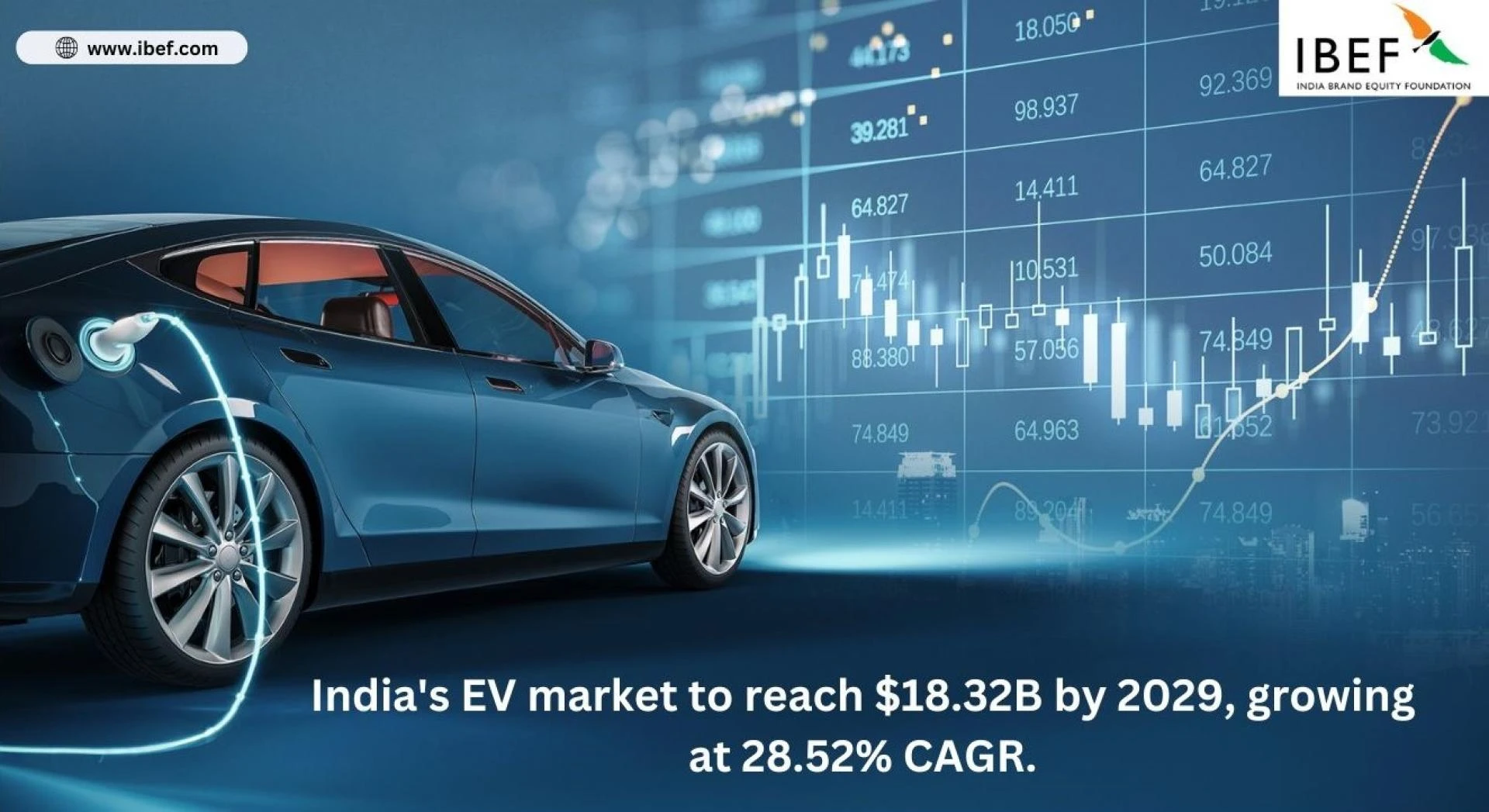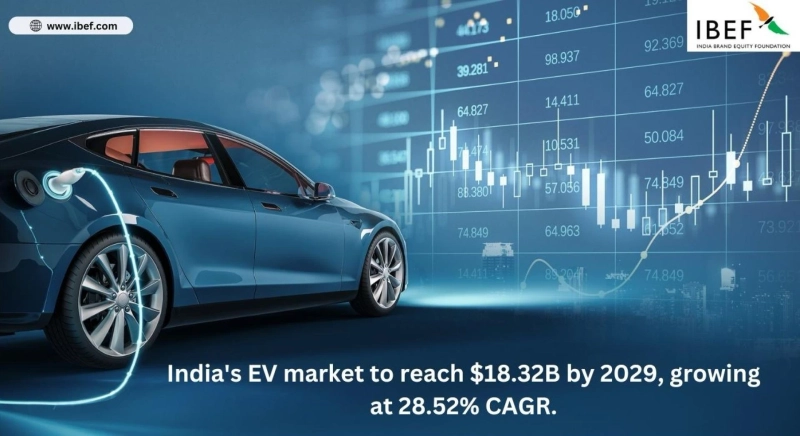India’s transition to electric mobility is accelerating, with electric vehicles in India gaining traction due to supportive government policies, growing infrastructure, and rising consumer demand. As the world shifts toward sustainable transportation, India is positioning itself as a leader in the electric vehicle market, aiming for 80 million EVs on its roads by 2030.
With the EV market growth forecasted at 28.52% CAGR, reaching US$ 18.319 billion by 2029, the future looks bright. Let’s explore the key trends shaping India’s EV journey.
Electric Vehicle Sales in India: A Market on the Rise
Electric vehicles sale in India are surging, reflecting a shift in consumer preferences and market expansion.
- In May 2024, EV sales grew by 20.88%, reaching 1.39 million units.
- In 2023, EV sales saw a 49.25% increase, crossing 1.52 million units.
- The Indian EV market is projected to expand from US$ 3.21 billion in 2022 to US$ 113.99 billion by 2029, at a 66.52% CAGR.
This rapid adoption highlights India’s commitment to sustainable mobility and the growing role of electric vehicle manufacturers in reshaping transportation.

Government Policies Accelerating EV Growth
India’s ambitious EV goals are backed by strong government initiatives to boost adoption and production:
- FAME (Faster Adoption and Manufacturing of Hybrid and Electric Vehicles) Scheme supports demand incentives for EV buyers.
- State EV Policies aim for 10% EV adoption in Maharashtra and 100% electrification of cargo vehicles in Karnataka by 2030.
- PLI (Production Linked Incentive) Scheme encourages local EV and battery production, strengthening India’s manufacturing base.
These measures are ensuring EV market growth, making India a major hub for electric mobility.
The Role of Electric Vehicle Manufacturers
Leading electric vehicle manufacturers are driving the market with new models and expanded production:
- Tata Motors dominates with affordable, high-performance EVs like the Nexon EV.
- Hyundai Motor India is expanding its fast-charging network to improve accessibility.
- Ola Electric is increasing production of electric two-wheelers to cater to urban commuters.
- Mahindra Electric is introducing new electric SUVs, strengthening the four-wheeler EV segment.
With a focus on local production, R&D, and innovation, these manufacturers are shaping the future of EV cars in India.
EV Charging Infrastructure: Addressing the Biggest Challenge
One of the major barriers to electric vehicle sales in India has been the lack of charging infrastructure. However, this is changing rapidly:
- As of February 2024, India has 12,146 operational public EV charging stations.
- Maharashtra, Delhi, and Karnataka lead in charging station availability.
- A Confederation of Indian Industry (CII) report estimates India needs 1.32 million charging stations by 2030, requiring 400,000 new installations annually.
With private and government investments in fast-charging technology, India is improving EV accessibility and reducing range anxiety.
Battery Technology: The Future of EVs in India
Battery technology plays a crucial role in the electric vehicle market. Advancements in battery production are driving EV market growth:
- India’s EV battery market is expected to grow from US$ 16.77 billion in 2023 to US$ 27.70 billion by 2028.
- Companies are investing in solid-state and lithium-ion battery innovations to increase efficiency.
- Local battery manufacturing will reduce costs and dependency on imports, making EV cars in India more affordable.
These improvements will enhance battery life, charging speed, and cost-effectiveness, making EVs a practical choice for Indian consumers.
State-Wise EV Adoption Trends in India
Several states are leading the electric vehicle sales in India, setting new benchmarks for EV penetration:
- Goa: 14.20% of all new vehicles sold in 2024 were electric.
- Tripura and Chandigarh: Fastest-growing EV adopters.
- Delhi: 10.72% EV share, reflecting strong policy support for clean mobility.
As more states implement aggressive EV adoption plans, electric vehicle manufacturers will see greater demand, accelerating EV market growth.
Consumer Interest in New Energy Vehicles (NEVs)
A recent survey highlights growing enthusiasm for EVs among Indian consumers:
- 83% of respondents plan to exclusively buy New Energy Vehicles (NEVs) by 2030.
- Consumers prioritize low operating costs, sustainability, and government incentives.
- With improved charging infrastructure, demand for EV cars in India is expected to soar.
These trends confirm that the electric vehicle market is moving towards mainstream adoption, making EVs a preferred choice for Indian buyers.
Investment and Foreign Interest in India’s EV Sector
The global shift to electric mobility is attracting major investments into electric vehicles in India.
- India’s EV finance industry is expected to reach US$ 50 billion by 2030, as per NITI Aayog and Rocky Mountain Institute (RMI).
- Major auto players are investing in Indian EV startups, battery tech, and new models.
- Foreign EV brands are entering the Indian market, increasing competition and consumer choices.
This influx of investments is further strengthening EV market growth, making India an attractive market for EV production and sales.
Projected Market Expansion and Growth Forecast
The future of electric vehicles in India looks promising, with key market projections:
- EV market growth at 28.52% CAGR, reaching US$ 18.319 billion by 2029.
- India’s EV market to expand from US$ 3.21 billion in 2022 to US$ 113.99 billion by 2029.
- India’s global EV battery market share is expected to reach US$ 27.70 billion by 2028.
With increasing government support and technological advancements, India’s EV sector will continue to thrive in the coming years.
Conclusion: The Road Ahead for EV Growth in India
India’s commitment to electric mobility, backed by strong government policies, technological innovation, and rising consumer interest, ensures that the country remains at the forefront of EV adoption. Electric vehicle manufacturers are expanding their portfolios, while improved charging infrastructure and battery technology are addressing key challenges.
With continued EV market growth, India is set to become a global leader in electric mobility. Learn more about the electric vehicle market at the India Brand Equity Foundation and stay informed about India’s journey toward a cleaner, greener future.
Also read:



